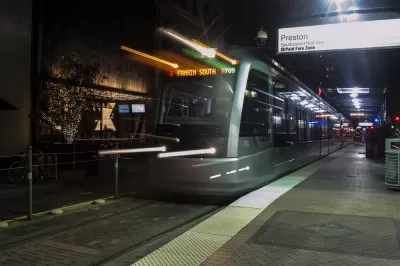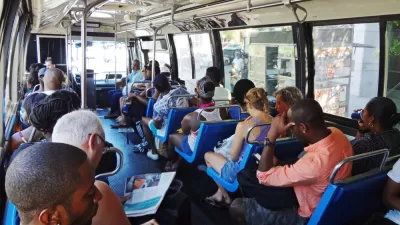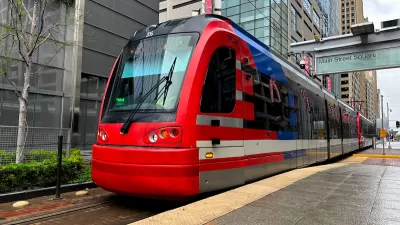A review of board members' Q Cards reveals the extent to which the people who implement Houston's transit policy actually use the system: some quite a bit, some not so much.

Following Houston voters' approval of a $3.5 billion transit bond measure, "riders have said it is critical leaders know what sort of improvements need to be built. The best way to do that, some say, is for [Metro] board members to experience it," Dug Begley writes.
But a Houston Chronicle review of Metropolitan Transit Authority board members' agency-issued Q cards reveals that some of the folks in charge aren't regular transit riders. The review "shows three Metro board members did not ride a single bus or train between Jan. 1, 2018, and Aug. 31, 2019. Other members were mixed, with some taking a handful of trips while others with different commuting locations and habits hop aboard frequently."
Sanjay Ramabhadran, one of the board members who logged the most trips, said that using the system is "an important determinant—but not the only one—board members should use" in making decisions, Begley reports. "We all bring different strengths to the board," Ramabhadran said. "Some of them might be riding the system, some of that might be financial or engineering."
Begley's write-up gives some background on each of Houston Metro's board members and outlines how often they use the system, as well as which parts of the system they tend to frequent.
FULL STORY: Metro board members will set course of $7.5B transit plan, but not all ride

Alabama: Trump Terminates Settlements for Black Communities Harmed By Raw Sewage
Trump deemed the landmark civil rights agreement “illegal DEI and environmental justice policy.”

Study: Maui’s Plan to Convert Vacation Rentals to Long-Term Housing Could Cause Nearly $1 Billion Economic Loss
The plan would reduce visitor accommodation by 25% resulting in 1,900 jobs lost.

Planetizen Federal Action Tracker
A weekly monitor of how Trump’s orders and actions are impacting planners and planning in America.

Waymo Gets Permission to Map SF’s Market Street
If allowed to operate on the traffic-restricted street, Waymo’s autonomous taxis would have a leg up over ride-hailing competitors — and counter the city’s efforts to grow bike and pedestrian on the thoroughfare.

Parklet Symposium Highlights the Success of Shared Spaces
Parklets got a boost during the Covid-19 pandemic, when the concept was translated to outdoor dining programs that offered restaurants a lifeline during the shutdown.

Federal Homelessness Agency Places Entire Staff on Leave
The U.S. Interagency Council on Homelessness is the only federal agency dedicated to preventing and ending homelessness.
Urban Design for Planners 1: Software Tools
This six-course series explores essential urban design concepts using open source software and equips planners with the tools they need to participate fully in the urban design process.
Planning for Universal Design
Learn the tools for implementing Universal Design in planning regulations.
Caltrans
Smith Gee Studio
Institute for Housing and Urban Development Studies (IHS)
City of Grandview
Harvard GSD Executive Education
Toledo-Lucas County Plan Commissions
Salt Lake City
NYU Wagner Graduate School of Public Service





























